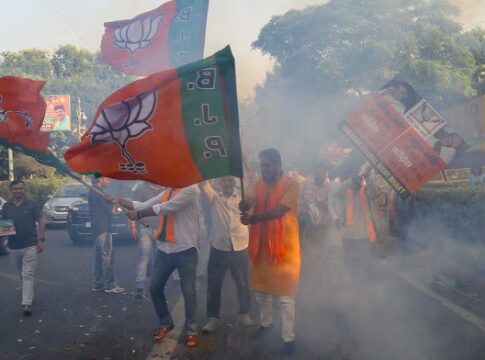In a paradox that stunned many observers, the ruling Bharatiya Janata Party (BJP) passionately advocated for the rights of Muslims during the recent Lok Sabha debate on the Waqf (Amendment) Bill 2025—despite the party’s complete absence of Muslim representation in Parliament.
A Party Without Muslim MPs Claims to Represent Muslim Interests
The BJP’s emphatic claim that the Waqf Bill was being passed for the benefit of economically disadvantaged Muslims raised more than a few eyebrows. Not only does the party not have a single Muslim MP in the Lok Sabha, but it has also failed to promote Muslim women or leaders into prominent political positions. In states like Gujarat—Prime Minister Narendra Modi’s political bastion—Muslims have not been given a single Vidhan Sabha ticket by the BJP in over two decades. The last such instance was in 1998.
READ MORE: Waqf Bill Sparks Political Chess Within NDA
Despite this, the party bulldozed the controversial Waqf Bill through Parliament, framing it as a pro-minority initiative. Critics, however, see it as part of a broader strategy to energize its core Hindutva base while appearing to act in the interests of a community that the party has systematically excluded.
A Pattern of Policies Centered Around Muslim Issues
Whether it’s revoking Article 370, criminalizing triple talaq, or implementing the Citizenship (Amendment) Act (CAA), the BJP’s political agenda frequently circles back to issues affecting Muslims. Many argue that this obsessive focus detracts from critical governance matters, such as the ongoing conflict in Manipur, which has seen 22 months of unrest. Tellingly, while the Waqf Bill debate lasted over 12 hours, the discussion on Manipur was scheduled post-midnight.
Executive Overreach and Constitutional Concerns
Legal experts and civil rights advocates have raised red flags over the Waqf Amendment Bill. They argue that the bill represents a sweeping centralization of power, undermining the autonomy of religious institutions. The move is seen as a violation of Article 26 of the Indian Constitution, which guarantees citizens the right to manage their religious affairs.
Moreover, the BJP’s narrative that Muslim communities have been misusing Waqf lands is widely contested. The bill significantly expands government control over Waqf boards—already under tight scrutiny—further heightening concerns about religious freedoms.
Supreme Court Shock and Bulldozer Politics
The BJP’s approach has even drawn the ire of the judiciary. The Supreme Court recently expressed that its “conscience is shocked” by the use of bulldozers to demolish Muslim homes in Prayagraj. Rather than fostering trust, the government’s actions appear to be stoking fear and insecurity within the Muslim community.
‘Saugat-e-Modi’ and Symbolism Over Substance
The contrast between gestures like gifting sweets during Eid under the banner of ‘Saugat-e-Modi’ and actions such as banning meat sales during Navratri—coinciding with Eid in some states—paints a troubling picture. Restrictions on public and even private observance of Muslim prayers have sparked outrage. Would such limitations ever be imposed on Ganesh Chaturthi celebrations? The double standards are glaring.
Deflection From Pressing National Issues
While the country faced economic challenges—including a 26% tariff on Indian exports announced by the US—the BJP declined to address these in Parliament. No statements were made on trade, and crucial discussions on electoral roll integrity were also blocked. Instead, the party prioritized an extended Waqf Bill debate, during which many BJP MPs engaged in inflammatory rhetoric, invoking Partition-era tropes and communal dog whistles.
An Alarming Trend in Parliamentary Functioning
The BJP’s legislative practices have come under scrutiny. Only 13% of bills passed in the Rajya Sabha between 2014 and 2024 were referred to parliamentary committees. In the Lok Sabha, the figure is just 16%. Prime Minister Modi himself has skipped every Question Hour since assuming office. Yet, when the subject is Muslims, the ruling party shows up in full force.
The Larger Implication: Governance Sidetracked by Obsession
From the delayed publication of the National Crime Records Bureau (NCRB) report to the stalled Census 2021 and the unresolved federal issues with states, several governance crises loom large. But instead of addressing these, the BJP’s energies seem fixated on religious politics.
Chants of “Muslim, Muslim, Muslim” echoed through Parliament, not as a call for inclusion, but as a tool of political theatre. For many critics, this signals a dangerous trend—where communal narratives eclipse the real concerns of a diverse and democratic nation.



